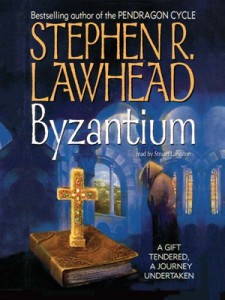 In general, I would say my feelings towards modern Christian fiction could best be described as embarrassed if not hostile. That is because…well…have you ever read Christian fiction? Dostoevsky it ain’t. However, I have long had a soft spot for the works of Stephen Lawhead. His writing is so good (usually) and the depth of his historical research is so impressive, insightful, and skillfully employed that I am loathe to group him under the title “Christian fiction” at all. Lawhead is a Christian who writes very good fiction. There is indeed often in Lawhead’s writings an evangelistic bent, one might say, and a sufficient enough one to have his works sold on the shelves of LifeWay. (This is not a criticism, I hope I need not say, nor is it a suggestion that this is disingenuous on Lawhead’s part. It is not.) Even so, there is a stark difference in Lawhead’s works and most of these other works in terms of quality.
In general, I would say my feelings towards modern Christian fiction could best be described as embarrassed if not hostile. That is because…well…have you ever read Christian fiction? Dostoevsky it ain’t. However, I have long had a soft spot for the works of Stephen Lawhead. His writing is so good (usually) and the depth of his historical research is so impressive, insightful, and skillfully employed that I am loathe to group him under the title “Christian fiction” at all. Lawhead is a Christian who writes very good fiction. There is indeed often in Lawhead’s writings an evangelistic bent, one might say, and a sufficient enough one to have his works sold on the shelves of LifeWay. (This is not a criticism, I hope I need not say, nor is it a suggestion that this is disingenuous on Lawhead’s part. It is not.) Even so, there is a stark difference in Lawhead’s works and most of these other works in terms of quality.
Lawhead’s Byzantium is a stand alone volume (he normally writes series) and is a profoundly impressive novel. The story involves a group of Irish monks who set out from their monastery to deliver the Book of Kells to the Emperor of Byzantium. Along the way, they face numerous trials and challenges that transform their pilgrimage from one of simple deliverance to one of genuine life transformation. The hero of the story is Aidan, a young monk who is chosen to go with the pilgrim party to deliver the prized possession to Byzantium. Aidan is ever-haunted by a vision he has had that he will die in Byzantium.
It is difficult to tell much more of the story without revealing numerous and major spoilers. Let me simply say that this is one of the better “there and back again” tales you will ever read. It is filled with numerous fascinating elements from the later second half of the first millennium: monasticism, the Vikings, emerging Islam, Eastern Christianity, Saracen pirates, Armenian soldiers, ocean warfare, orthodoxy vs. heterodoxy, imperial political intrigue, the nature of slavery, social status, pagan spirituality, theodicy, gender relations, the eating habits of ancient people’s, Western Christianity, Rome, ancient money, etc. Above all, however, we find in this story a moving and challenging account of one man’s attempt to hold on to faith in the midst of very trying circumstances.
There are some particularly powerful points in this book. Bishop Cadoc’s sermon before the departure of the monks was quite beautiful. Aidan’s conversation with the Vikings concerning the gospel and, in particular, the impact of that story on his pagan listeners was extremely well done. And, finally, one of the Vikings’ account of how the gospel had grasped his own mind and heart was really quite moving.
This is a large book and a long journey, but one that is very well worth it! This is probably the best Lawhead book I’ve ever read. I would highly recommend it to anybody who would like to read an extremely well done example of historical fiction and, above all else, a really good story!

Thank you for your well argued recommendation, it makes sense to me!
Thank you! God bless you.
I absolutely concur. . . this book would make a terrific movie and I wish someone like Peter Jackson (Lord of the Rings et al) would pick it up and run with it . . . can you just imagine the scene where Aiden and the vikings were portaging the ships over the pass between the Dvina and Dnieper Rivers . . . God please somone in my lifetime make this movie.
Right on Chris! Could not agree more!